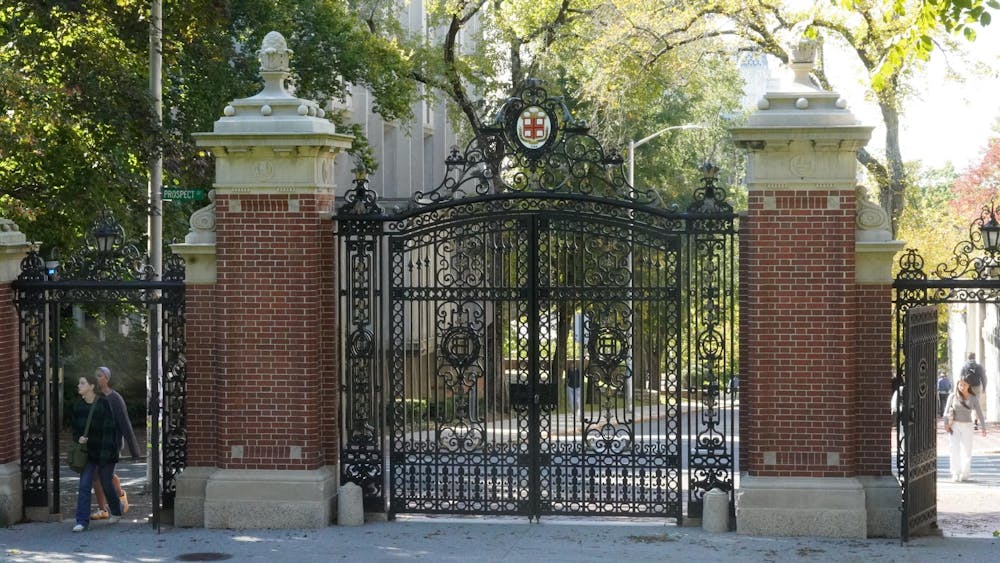In their letter to the Brown community announcing that the Corporation voted against a divestment proposal from 10 companies with ties to Israel, President Christina Paxson P’19 P’MD’20 and Chancellor Brian Moynihan ’81 P’14 P’19 wrote that Brown’s mission is “not to adjudicate or resolve global conflicts.”
The communications indicate that despite heightened calls for divestment from companies with ties to Israel, the University has made a critical decision that goes beyond the one-time proposal: not to take an official stance.
Brown is not alone in this course of action.
Facing invigorated campus protests, a slate of top colleges and universities have adopted policies of institutional neutrality, which typically prohibit administrators from commenting on contentious social or political issues.
In May, Harvard decided to refrain from commenting on public policy issues. Schools such as Penn and Barnard College have adopted official institutional neutrality policies. At others, including Yale and Columbia, the move is still under consideration.
In the last year, three Ivy League presidents have stepped down following backlash against statements they made regarding the Israel-Hamas war. University presidents have found that institutional neutrality could “remove them from the political crossfire,” according to Luther Spoehr, a senior lecturer emeritus in education at Brown.
Brown’s Public Statement Policy, created in 2022, states that Brown “may exercise its leadership by issuing institutional leadership messages, or Public Statements, for matters of direct impact to the Brown community or matters affecting higher education and/or the ability of Brown or other educational institutions to fulfill their mission of education and research.”
Unlike the policies of many of its peer institutions, Brown’s policies allow institutional statements on matters that impact other institutions of higher education internationally, not just Brown.
Still, public statements must meet certain criteria, including alignment with Brown’s mission.
Brown may issue public statements if an event would affect Brown or other institutions of higher education in their ability to pursue Brown’s mission, if the issue directly impacts students, faculty and staff in their roles or if “Brown’s influence or advocacy has the capacity, ability or potential to effect change,” according to the policy.
University Spokesperson Brian Clark wrote that the policy means that Brown doesn’t make “institutional statements on social, political or policy matters unrelated to the University’s operations in advancing education, scholarship and discovery.”
Since the start of the Israel-Hamas war, Paxson and other University officials have gestured to this policy in response to calls for divestment.
“On very contested issues where there are many different views, we don’t feel it’s appropriate for the University to take sides,” she said in a February interview with The Herald.
Clark cited the importance of maintaining academic environments for debate and discussion as the reasoning behind Brown’s Public Statements Policy.
“Sustaining an academic environment in which this is the case is fundamentally important to our collective ability to fulfill Brown’s teaching and research mission,” he wrote.
What is institutional neutrality?
Institutional neutrality has a long history at colleges and universities. Most often it is associated with the University of Chicago’s “Kalven Report,” created in 1967 during the Vietnam War.
The report suggests that a university should not “speak for the institution and issue statements that take a side on important public controversies that do not directly bear on the university’s mission as an educational institution,” Spoehr explained.
But institutional neutrality does not “preclude members of the university community from making their own public statements as individuals,” he said. Rather, it prevents individuals from making statements on the entire unit, whether that be an academic department or the university as a whole.
Supporters of institutional neutrality tend to argue that it would be unfair for a university to take an official position that portions of its community do not share. Doing so, the argument goes, would give the university a new role “beyond its foundational ones of inquiry and instruction,” Spoehr said.
“A university that doesn’t stay in its lane risks becoming — or at least being seen as — just another partisan organization,” Spoehr wrote.
But the policy has faced backlash.
“Institutional neutrality does not exist,” said Ellen Schrecker, a higher education historian and professor emerita of American history at Yeshiva University.
“Universities are implicated in everything that’s going on in American society, and we can never see institutional neutrality, so why call for it?” she added. “What we need to see is institutional, genuine support for free speech.”
Speaking on universities and colleges generally, Schrecker expressed her concern that many university codes of conduct make it more difficult to express free speech by specifying the places, times and manners that speech can occur.
At many universities, she argued, neutrality is hard to achieve. “What we’re seeing is not exactly institutional neutrality, but institutional support of the status quo.”
The discussion about institutional neutrality and public statements at Brown is not over.
In their Oct. 9 letter, Paxson and Moynihan wrote that “Brown’s standards for divestment should be reviewed to ensure that they are aligned with the Public Statement Policy.”
The two added that “divestment would be a symbolic political statement,” a position shared by an advisory committee that had previously recommended against divestment.
Clark acknowledged the difficulty in distinguishing between investment and taking an official stance.
“With the October meetings having just concluded, considering this will be a question for the future, but the timeline has not been determined,” he wrote.

Cate Latimer is a university news editor covering faculty, University Hall and higher education. She is from Portland, OR, and studies English and Urban Studies. In her free time, you can find her playing ultimate frisbee or rewatching episodes of Parks and Rec.





